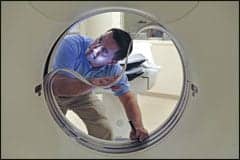The U.S. Department of Labor (DoL) has approved the creation of a modern apprenticeship program for prospective biomedical equipment technicians (BMET). The new program, launched by the Association for the Advancement of Medical Instrumentation (AAMI), replaces a decades-old curriculum, and offers “fresh off-the-street” apprentices on-the-job training.
“The program is an open door, offering a great career with no student debt,” says Maggie Berkey, CBET, a senior BMET for Common Spirit Health and a member of AAMI’s Technology Management Council. “Success will be seeing more positions getting filled more quickly, and not just by warm bodies, but by people ready to do the job safely and effectively!”
The backbone of hospitals and even laboratories, BMETs routinely service the medical devices that are needed to monitor patient health or record important data. When networked medical devices fail to communicate with one another, it is up to well-trained professionals to figure out what went wrong. And in a hospital setting, crucial device repairs often cannot wait for the manufacturer to send a technician.
Of course, experienced BMETs are in high demand. The U.S. Bureau of Labor Statistics projects that nearly 3,000 new BMET positions will be created by 2029, with an above-average growth rate of 5% for the field. What worries managers is that nearly half of the current healthcare technology management (HTM) workforce is over the age of 50. As more BMETs retire and the number of college programs to train new HTM professionals dwindles, the demand for new hires will only increase.
“Across the U.S., we’re seeing job openings for BMETs not getting filled for eight or nine months at a time, and colleges are being forced to drop their BMET programs due to budgetary constraints,” says Danielle McGeary, AAMI’s vice president of HTM. “This only serves to widen a training gap between the country’s most senior and soon to be retiring BMETs and the next generation of HTM professionals.”
The new BMET Apprenticeship program, co-designed by McGeary and Berkey, is a step toward closing that gap. “The idea is to take individuals practically right off the street, near wherever positions need filling, and train them on the job. They learn from other BMETs with 20 or 30 years of experience while getting valuable hands-on experience, and by the time they’re done training, they’re ready to go on call,” says Berkey.
She adds, “They already know the policies and safety procedures of the facility they worked at. They know the equipment and customers, and they’ve had those critical interactions that you can’t train for with a textbook!”
The new AAMI program replaces a four-year BMET program that was established in the 1990s. The modernized program boasts a shorter term, with 4,000 to 6,000 hours of paid, on-the-job training in safety, electronics, anatomy, information technology, and more. Apprentices will study and acquire AAMI’s premier CABT certification for professionals entering the BMET field, a certification in IT Fundamentals, and finally become a certified biomedical equipment technician.
“With the certification being built right in, you know that this person has at least this minimum knowledge base, that they’re teachable, and they have a broad understanding of what their job is and what their responsibilities are,” Berkey says. “It sets a bar of excellence for our industry, and that’s what we all want!”
For trainees that already have some of the required training completed, an employer can fast track the apprenticeship. Program graduates earn a certificate from AAMI and the DoL, asserting that their training meets a national standard of excellence.
Employers cover the expense of training and certification with support from the DoL. In turn, participating organizations are offered state tax credits for taking on apprentices. The National Apprenticeship Act of 2021, recently passed by the U.S. House of Representatives, may also provide support as soon as early 2022.






This is another way to degrade the Biomedical profession. Instead of pushing for higher education compatible to IT professionals, this will create a job that pays less and will not be considered at all in the administrative scheme. AAMI should work with colleges and institutions to elevate the profession of Clinical Eng. or BMET’s, not lower the standards even further.